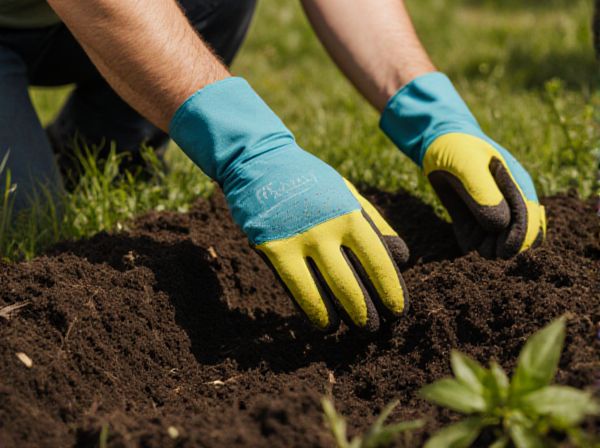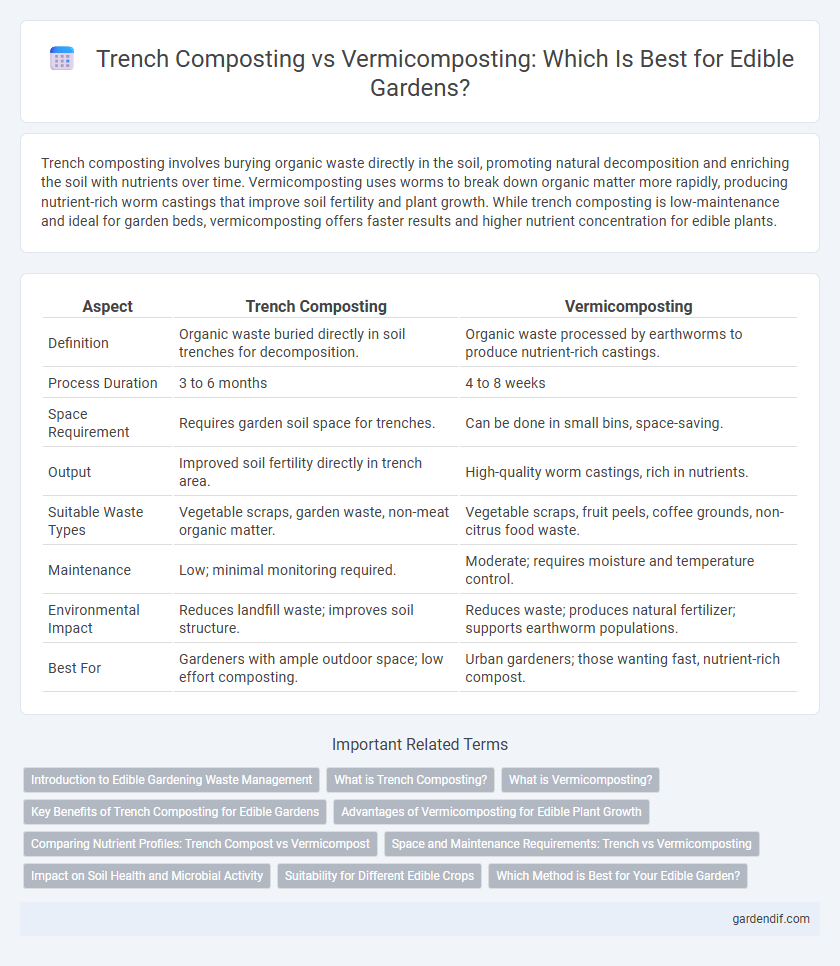
Trench composting vs Vermicomposting Illustration
Trench composting involves burying organic waste directly in the soil, promoting natural decomposition and enriching the soil with nutrients over time. Vermicomposting uses worms to break down organic matter more rapidly, producing nutrient-rich worm castings that improve soil fertility and plant growth. While trench composting is low-maintenance and ideal for garden beds, vermicomposting offers faster results and higher nutrient concentration for edible plants.
Table of Comparison
| Aspect | Trench Composting | Vermicomposting |
|---|---|---|
| Definition | Organic waste buried directly in soil trenches for decomposition. | Organic waste processed by earthworms to produce nutrient-rich castings. |
| Process Duration | 3 to 6 months | 4 to 8 weeks |
| Space Requirement | Requires garden soil space for trenches. | Can be done in small bins, space-saving. |
| Output | Improved soil fertility directly in trench area. | High-quality worm castings, rich in nutrients. |
| Suitable Waste Types | Vegetable scraps, garden waste, non-meat organic matter. | Vegetable scraps, fruit peels, coffee grounds, non-citrus food waste. |
| Maintenance | Low; minimal monitoring required. | Moderate; requires moisture and temperature control. |
| Environmental Impact | Reduces landfill waste; improves soil structure. | Reduces waste; produces natural fertilizer; supports earthworm populations. |
| Best For | Gardeners with ample outdoor space; low effort composting. | Urban gardeners; those wanting fast, nutrient-rich compost. |
Introduction to Edible Gardening Waste Management
Trench composting and vermicomposting are effective methods for managing edible gardening waste, enhancing soil fertility naturally. Trench composting involves burying organic scraps directly in garden trenches where they decompose slowly, enriching the soil in place. Vermicomposting uses specialized worms, primarily red wigglers, to rapidly break down food waste into nutrient-rich castings that boost plant growth and improve soil structure.
What is Trench Composting?
Trench composting is an eco-friendly gardening method involving burying organic waste directly into shallow trenches dug in the soil, where it decomposes and enriches the earth naturally. This technique accelerates soil amendment by promoting microbial activity, improving soil structure and fertility without the need for bins or turning. Common materials used include kitchen scraps, vegetable peels, and plant residues, making trench composting a simple yet effective strategy for sustainable waste recycling.
What is Vermicomposting?
Vermicomposting is a method of composting that uses specific species of earthworms, such as red wigglers, to break down organic waste into nutrient-rich humus, ideal for enriching garden soil. This process accelerates decomposition compared to traditional trench composting by enhancing aeration and microbial activity, resulting in faster production of high-quality compost. Vermicomposting produces valuable worm castings that improve soil structure, water retention, and plant growth, making it a sustainable and efficient choice for waste recycling in edible gardening.
Key Benefits of Trench Composting for Edible Gardens
Trench composting enhances soil fertility in edible gardens by directly enriching the root zone with organic matter, promoting healthy plant growth and improved nutrient uptake. This method increases soil moisture retention and aeration, creating an optimal environment for vegetable crops and herbs. By reducing garden waste on the surface, trench composting also minimizes pests and diseases, contributing to healthier edible plants.
Advantages of Vermicomposting for Edible Plant Growth
Vermicomposting enhances edible plant growth by producing nutrient-rich worm castings that improve soil aeration, moisture retention, and microbial activity. This organic fertilizer supplies essential nutrients like nitrogen, phosphorus, and potassium in a readily available form, promoting healthier root development and increased crop yields. Compared to trench composting, vermicomposting accelerates nutrient cycling and reduces the presence of pathogens, resulting in higher-quality soil amendments for edible gardens.
Comparing Nutrient Profiles: Trench Compost vs Vermicompost
Trench composting enriches soil by decomposing organic matter directly in the ground, often yielding a nutrient profile rich in nitrogen, phosphorus, and potassium essential for plant growth. Vermicomposting produces nutrient-dense castings high in beneficial microbes, enzymes, and micronutrients like calcium, magnesium, and iron, enhancing soil structure and plant health more rapidly. Comparing nutrient profiles, vermicompost offers a more balanced and bioavailable nutrient source, while trench compost provides slower nutrient release and improves soil aeration and moisture retention over time.
Space and Maintenance Requirements: Trench vs Vermicomposting
Trench composting requires minimal space as it involves burying organic waste directly into the soil, making it ideal for small gardens or limited outdoor areas. Vermicomposting demands a designated bin or container for housing worms, which may require more maintenance and regular monitoring to ensure optimal conditions such as moisture and temperature. Both methods efficiently recycle food scraps but differ significantly in space usage and ongoing upkeep.
Impact on Soil Health and Microbial Activity
Trench composting enriches soil by decomposing organic matter directly underground, enhancing soil structure and moisture retention while fostering beneficial microbial populations. Vermicomposting accelerates nutrient cycling through the digestion process of earthworms, producing nutrient-rich castings that significantly boost microbial diversity and activity in the soil. Both methods improve soil health, but vermicomposting provides a concentrated microbial inoculant that intensifies biological activity more rapidly.
Suitability for Different Edible Crops
Trench composting suits root vegetables and leafy greens by enriching soil directly where they grow, improving nutrient absorption and moisture retention. Vermicomposting excels for fruiting crops like tomatoes and peppers by producing nutrient-rich worm castings that enhance soil fertility and plant growth. Choosing between methods depends on crop type and desired nutrient delivery efficiency for optimal edible yields.
Which Method is Best for Your Edible Garden?
Trench composting enriches soil directly by burying organic waste, improving aeration and moisture retention for root crops and less maintenance gardeners. Vermicomposting employs worms to rapidly break down kitchen scraps into nutrient-dense castings ideal for high-demand edible plants like herbs and leafy greens. Choosing between trench composting and vermicomposting depends on garden space, plant type, and desired compost speed for optimal edible garden growth.
Trench composting vs Vermicomposting Infographic

 gardendif.com
gardendif.com